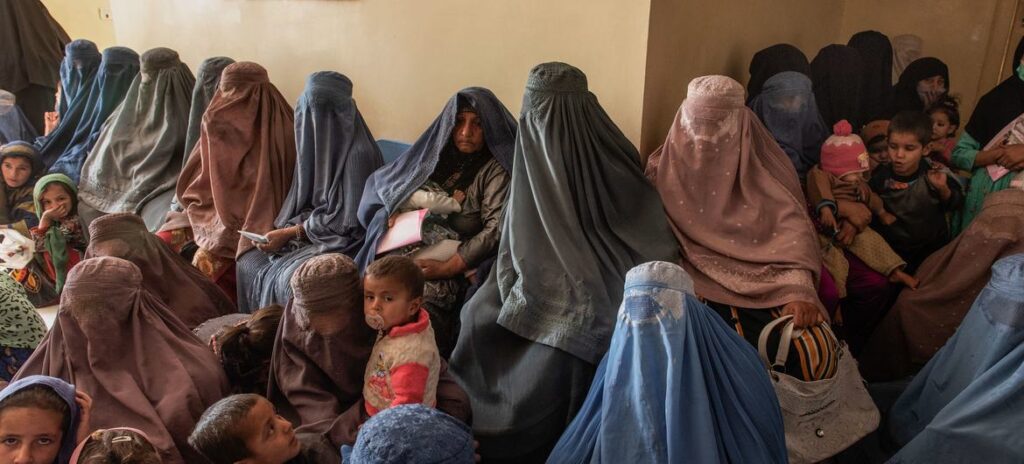Doha/New York, May 1 – U.N. Secretary-General Antonio Guterres is leading a two-day meeting in Doha to seek ways to engage with the Taliban on human rights, in particular for Afghan women and girls. The meeting is attended by special envoys for Afghanistan from 21 countries, and representatives from the European Union and the Organization of Islamic Cooperation.
“The aim is to reinvigorate international engagement around key issues, such as human rights, in particular women’s and girls’ rights, inclusive governance, countering terrorism and drug trafficking,” the U.N. said. “The meeting is intended to achieve a common understanding within the international community on how to engage with the Taliban on these issues.”
The participants in the meeting are from the following countries and organizations: China, France, Germany, India, Indonesia, Iran, Japan, Kazakhstan, Kyrgyzstan, Norway, Pakistan, Qatar, Russia, Saudi Arabia, Tajikistan, Türkiye, Turkmenistan, United Arab Emirates, United Kingdom, United States, Uzbekistan, European Union and the OIC.
The 15-nation U.N. Security Council, which is divided by various issues, including the war in Ukraine, unanimously adopted on April 27 a resolution which unequivocally condemned the de facto authorities in Kabul for banning Afghan women from working for U.N. humanitarian operations and Afghan girls from schools. The council demanded a “swift reverse” of the bans and called for the “full, equal, meaningful and safe participation of women and girls in Afghanistan.”
The resolution, which was co-sponsored by the United Arab Emirates and Japan, expressed “deep concern at the increasing erosion of respect for the human rights and fundamental freedoms of women and girls in Afghanistan by the Taliban” and reaffirmed their “indispensable role” in Afghan society.
The resolution called on the Taliban to swiftly restore their access to education, employment, freedom of movement and equal participation in public life. And it urged all other U.N. member nations to use their influence to promote “an urgent reversal” of the Taliban’s policies and practices toward women and girls.
The U.N. said there were about 600 international staffers in Afghanistan and 3,300 Afghan nationals, including 2,700 men and 600 women, who worked for the U.N. in the country before the Taliban banned the women. The international humanitarian programs were assisting more than 28 million Afghan people.
U.N. News reported that a recent study conducted by the U.N. Development Program, titled Afghanistan Socio-Economic Outlook 2023, depicted Afghanistan’s economic recovery as grim as long girls are banned from attending schools and women are not allowed to hold jobs. The study said the country’s economic output collapsed by 20.7 percent following the Taliban takeover in 2021 and the shock has kept Afghanistan among the world’s poorest countries. The country’s GDP declined by 3.6 percent in 2022.
“A sustained inflow of foreign aid, to the tune of $3.7 billion in 2022, has helped avert the total collapse of Afghanistan,” said UNDP Resident Representative in Afghanistan Abdallah Al Dardari. The U.N. contributed $3.2 billion of the overall $3.7 billion in foreign aid to Afghanistan in 2022.
The new report projects that the 2023 GDP in Afghanistan could increase by 1.3 percent if the level of foreign aid remains at $3.7 billion. However, prospects for economic recovery remain weak and insufficient over the long term, especially if foreign aid is withheld as a result of restrictive Taliban policies.
“There will be no sustainable recovery without the active participation of Afghan women in the economy and in public life, which includes delivering on humanitarian and livelihoods-saving projects,” said UNDP Regional Director for Asia and the Pacific, Kanni Wignaraja. “Only the full continuity of girls’ education and women’s ability to pursue work and learning can keep the hope of any real progress alive.”
“Afghanistan is on the brink of economic collapse, exacerbated with the takeover in August 2021. The effects of the pandemic, followed by an extraordinary 20.7 percent contraction of the economy, and an unusually severe drought, have resulted in the loss of food, livelihoods and access to basic services,” said UNDP Administrator Achim Steiner in a statement. “Only the continued provision of international aid and basic services to millions of Afghans have prevented a full collapse.”
United Nations correspondent journalists – United Nations correspondent journalists – United Nations correspondent journalists – United Nations journalism articles – United Nations journalism articles – United Nations journalism articles – United Nations News – United Nations News – United Nations News

